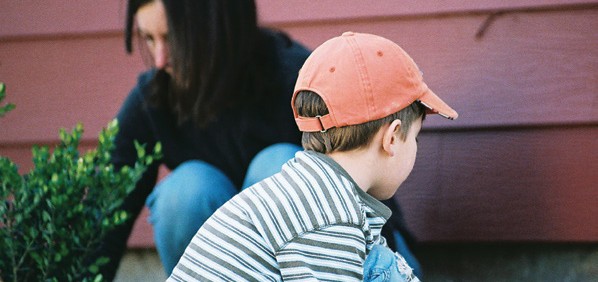
What Helps?
The Messages for Parents booklet is available to download as a PDF document
About this informationResearch shows that parents can really help their children cope with the changes that can arise during and after separation. This information will give you some ideas about how you and your children's other parent can help your children adjust. |
|
|
 Children benefit from positive relationships with both parents, wherever safe and possible. Children benefit from positive relationships with both parents, wherever safe and possible. |
|
|
Support your children's relationship with their other parentWhen an adult relationship ends, it can be difficult not to let your feelings get in the way of your children's relationship with their other parent. Children benefit from positive relationships with both parents, wherever safe and possible. It is important for them to know that you are OK with this and that you support them having a good relationship with their other parent. |
Work togetherImagine that your ex-partner is a work colleague - this can help you separate out your feelings towards them as an ex-partner from your feelings towards them as a parent. Focus on the important business of working together to bring up your children, jointly planning for your children's lives and supporting each other as parents. Before making significant decisions that concern your child, consult their other parent where possible, so that workable arrangements can be made. |
Make a planChildren need to know what is happening in their lives. You might want to prepare a parenting plan. This will help you to focus on a number of different areas. Parenting plans are unique to your situation but could include agreements about living arrangements, keeping in touch with wider family and friends, school, holidays and other special days, health issues, money matters and communication. Try to keep conversations about money matters separate from conversations about the time your children spend with each of you. It can be helpful to keep some things the same for your children, particularly when they are trying to cope with the changes that separation can bring. |

Be clear
Don't assume that you both have the same understanding about an agreement or a parenting plan. Be clear about the details – you might even want to write some things down. This can help to avoid misunderstandings and arguments.
ArrangementsWhether parents live together or apart, the time that children spend with each parent varies between families. What happens after a separation depends on a lot of factors, such as what your relationship was like with your children prior to living apart, the age of your children and how far apart you live. Arrangements should take into account what is best for your children. There are lots of other ways to keep in touch with your children when they are not with you – letters, cards, phone calls, texts, emails, Facetime/Skype, or record yourself reading a story so that they can listen to it at bedtime. |
|
|
 It is important that children don't feel like they are being asked to take sides or make the decisions. It is important that children don't feel like they are being asked to take sides or make the decisions. |
|
|
ReviewChildren's needs change as they grow and develop, and other circumstances might change for you or your child's other parent. It is important to agree how you are going to review and make adjustments to your plan and arrangements. |
Children's viewsIt can be helpful for your children to have the opportunity to share their views with you before you and their other parent make significant decisions that affect them. However it is important that children don't feel like they are being asked to take sides or make the decisions themselves. Parents make the final decision. |

Their own spaceIt is important for children to feel that they have a home with each parent if they are spending time in both homes. This includes having their own space. In many families it won't be practical for them to have their own room, but it could mean that they have a space within a room to call their own. |
Parenting StylesParents can have different parenting styles and values whether they are living together or apart. For example, parents might think differently about how much time children are allowed to spend watching T.V. or bedtimes. It can be helpful to try to agree together what you would like to be the same for your children and what can be different. Children can cope with differences as long as each parent is consistent. It is helpful if you can respect the other parent's household rules and encourage your children to respect them too |
|
|
 Children can cope with differences as long as each parent is consistent. Children can cope with differences as long as each parent is consistent. |
|
|
Positive moves
Sometimes children can find it unsettling when they move from spending time with one parent to spending time with the other parent. They might pick up on your feelings and be worried about you. Parents who live apart can help their children to manage these times. Think through how you can make this happen and agree on how you are both going to make this a positive experience for your children.
Put yourself in their shoes
- They hear you criticise their Mum or Dad in front of them?
- You ask them to pass on an angry message to their Mum or Dad?
- You ask them intrusive questions about their Mum or Dad?
- They have to hide their feelings about their Mum or Dad?
- You don't turn up to see them or are very late?
- You and their other parent argue in front of them a lot of the time?
Support
Sometimes parents can find it difficult to make arrangements for their children with their ex-partner or talk about parenting issues. They might be finding it difficult to come to terms with the breakdown of their relationship or they might be worried about the impact of separation on their children. It's OK to ask for help.
Relationships Scotland's network of Member Services supports individuals, couples and families experiencing conflict and relationship difficulties across all of mainland and island Scotland. This support includes family mediation, counselling, child contact centres and other family support services.
Some Services also provide support directly to children and young people affected by separation such as meeting with children and young people as part of the mediation
Safety
Some of these ideas may not fit your situation if you have concerns about your own safety or the safety of your children.
This might be due to violence or abuse, alcohol or substance misuse, or other issues. Professional advice and help is recommended, see resources on our website www.relationships-scotland.org.uk/family-support.
Continue reading
The Messages for Parents booklet is available to download as a PDF document
References
- McGhee, C. (2011). Parenting Apart. New York: Berkley Books.
- Mooney, A. et al. (2009). Impact of Family Breakdown on Children's Well-being: Evidence Review. Thomas Coram Research Unit, University of London.
- Reynolds, J. et al. (2014). Parental Conflict: Outcomes and interventions for children and families. Bristol: Policy Press.
- Woodall, K. & Woodall, N. (2009). Putting Children First: A Handbook for Separated Parents. London: Piatkus Books Ltd.
